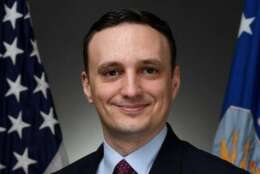Defense
-
This discussion with Microsoft is part of Federal News Network’s DoD Cloud Exchange.
March 25, 2021 -
This discussion with Hillery Hunter of IBM and Stephanie Chiras of Red Hat is part of Federal News Network's DoD Cloud Exchange.
March 25, 2021 -
This discussion with Jeff Luckett of GDIT is part of Federal News Network's DoD Cloud Exchange.
March 25, 2021 -
This discussion with Rob Carey of Cloudera is part of Federal News Network's DoD Cloud Exchange.
March 25, 2021 -
This discussion with Paul Puckett, the director of the Enterprise Cloud Management Office for the Army, is part of Federal News Network’s DoD Cloud Exchange.
March 25, 2021 -
This discussion with John Hale, the chief of cloud services at the Defense Information Systems Agency, is part of Federal News Network’s DoD Cloud Exchange.
March 25, 2021 -
Day 2 Keynote of Federal News Network's DoD Cloud Exchange: The Air Force's chief software officer, Nicolas Chaillan, talks with Jared Serbu about the Air Force's embrace of multi-cloud and DevSecOps via Cloud One and Platform One.
March 25, 2021 -
This discussion with Lyle Kellman of GDIT is part of Federal News Network's DoD Cloud Exchange
March 25, 2021 -
This three-day special event from Federal News Network brought together dozens of Defense Department and industry experts to explain why the definition of “the cloud” has evolved over the past decade.
March 25, 2021 -
This discussion with Chris Mayfield is part of Federal News Network's DoD Cloud Exchange.
March 25, 2021 -
This discussion with Dave Zukowski, a principal technical consultant for public sector at Akamai, is part of Federal News Network’s DoD Cloud Exchange.
March 25, 2021 -
This discussion with Veritas is part of Federal News Network’s DoD Cloud Exchange.
March 25, 2021 -
This discussion with Caroline Bean of the Defense Information Systems Agency is part of Federal News Network's DoD Cloud Exchange.
March 25, 2021 -
This discussion with Mansour Yusuf, the chief cloud architect at Dell Federal, and Daniel Ellis, a staff Solutions architect at VMware, is part of Federal News Network’s DoD Cloud Exchange.
March 25, 2021 -
A watchdog report finds that a former Navy civilian auditor sexually harassed at least a dozen female employees for more than two decades as part of a pervasive pattern of misconduct and retaliation
March 24, 2021
















